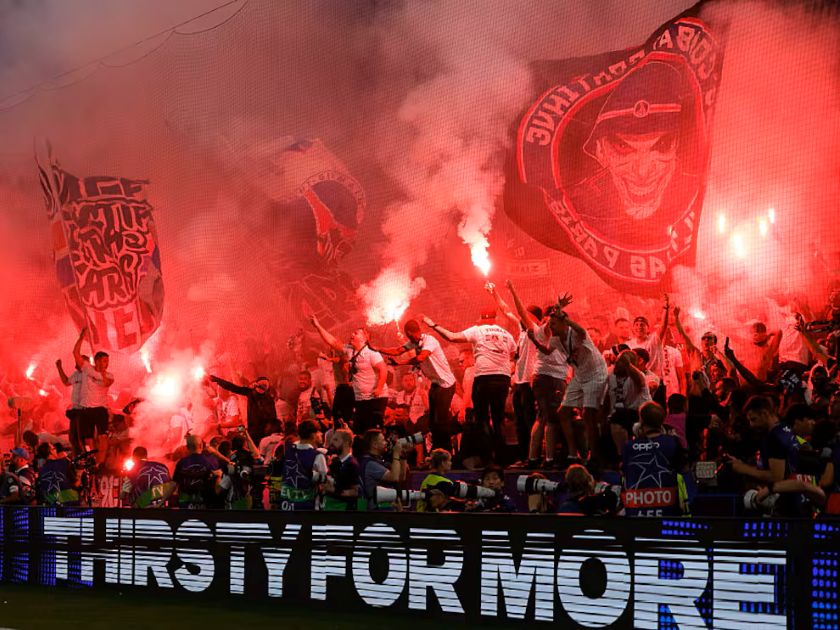PSG and Inter Milan Ultras Clash Across Munich During Champions League Final Day, Disrupting Metro Services and Raising Major Security Concerns
Violence erupts in Munich as PSG and Inter Milan ultras clash before Champions League Final, sparking security and transit disruption.
The city of Munich, chosen as the venue for the 2025 UEFA Champions League Final, faced an unexpected crisis on May 31 as violent outbreaks disrupted what was meant to be a celebration of European football. As Paris Saint-Germain (PSG) and Inter Milan prepared to face off at the Allianz Arena, clashes erupted across public spaces, transport hubs, and near the stadium, drawing serious concerns about safety and crowd management.
Despite extensive planning by local authorities and UEFA, the situation escalated rapidly, with radical supporter groups from both clubs engaging in confrontations that left several people injured, disrupted public services, and cast a shadow over one of the biggest sporting events of the year.
Munich Metro Turns into a Battlefield as Fan Violence Escalates
The first signs of unrest emerged in Munich’s central metro network. Large groups of PSG and Inter Milan fans had descended upon the city, and tension had been simmering throughout the day. That tension exploded underground as rival ultras clashed in crowded subway platforms and inside train carriages.
Eyewitness accounts and security updates from the city revealed that multiple confrontations were sparked by coordinated groups instigating fights with flares, aggressive chants, and physical altercations. Riot police were quickly deployed to strategic locations in the metro to intervene. Tear gas was used in several stations to break up large, hostile gatherings making their way toward the stadium.
Transport operations were heavily affected. Authorities confirmed delays, temporary suspensions of services, and the rerouting of metro lines as officers tried to separate rival fans and protect general passengers—many of whom were families, elderly travelers, and tourists caught in the chaos. Emergency coordination between transit operators and federal law enforcement helped minimize risks, but the situation proved extremely difficult to control once violence erupted.
Clashes Spill Onto Munich Streets, Prompting Police Intervention
The disturbances weren’t limited to underground stations. By midday, violence had spilled over into public squares, streets, and commercial districts across central and southern Munich. Law enforcement made repeated efforts to create safe zones between opposing groups, but small-scale street battles kept flaring up across the city.
Footage posted on social media throughout the afternoon depicted masked individuals igniting flares and physically engaging with rival fans in broad daylight. Objects were hurled, flags were burned, and roadways were blocked in several neighborhoods. The German Interior Ministry later confirmed that while no deaths had occurred, multiple individuals sustained injuries—some requiring medical attention—and dozens were taken into custody for disorderly conduct and possession of illegal pyrotechnics.
As tensions escalated, the city activated contingency security measures. Additional patrol units were dispatched, and access to several fan zones and public screening areas was restricted. Law enforcement teams maintained a heavy presence at key intersections, attempting to stabilize the situation as the clock ticked toward kickoff.
Stadium Security Struggles Amid Surging Crowds
As the evening approached and thousands of ticketed fans began arriving at the Allianz Arena, stadium security teams braced for a challenging entry process. Despite increased security at checkpoints, clashes among certain supporter groups continued, especially in the PSG section.
Inside the stadium, the tension remained palpable. Shortly after PSG opened the scoring with goals from Achraf Hakimi and Lamine Douré, fans in the ultras section behind goalkeeper Gianluigi Donnarumma ignited several flares. The smoke quickly spread through adjacent seating areas, creating visibility issues and prompting concern among stewards and match officials.
Although play was briefly impacted, officials chose not to suspend the match. Security teams acted swiftly to contain the disturbance, but UEFA has since confirmed that all incidents will be reviewed through formal post-match investigations.
PSG Clinches Historic Victory Amidst Unrest
Despite the mayhem outside the pitch, the game itself proceeded to a full conclusion. PSG delivered a stunning performance, overpowering Inter Milan 5–0 and clinching their first-ever UEFA Champions League title. For the French club, the win was historic—years of near misses and heartbreak finally giving way to continental glory.
Yet, the victory celebrations were muted for many due to the disruptive scenes that unfolded across the city. Officials from UEFA and the Bavarian state government expressed gratitude to emergency responders and security forces for ensuring the match could go ahead without a complete shutdown.
UEFA Set to Launch Investigation, Disciplinary Action Likely
In the wake of the final, UEFA is preparing to conduct a full inquiry into the violence. The investigation will involve detailed analysis of surveillance footage from both public areas and inside the stadium, as well as matchday reports submitted by local law enforcement and stadium officials.
Disciplinary action is expected to follow. UEFA’s regulations clearly prohibit the use of pyrotechnics, public disorder, and any form of violence or discriminatory conduct during official competitions. Both PSG and Inter Milan could face financial penalties, partial stadium closures in future matches, or stricter fan control measures.
Football authorities in France and Italy are also expected to review the conduct of their traveling supporter groups. National federations may impose additional restrictions or mandates to prevent similar disturbances during future international matches.
Public Concern and Questions Over Security Planning
The events in Munich have reignited debates across Europe about how to handle high-stakes fixtures involving fanbases with histories of ultra behavior. For German authorities—long experienced in hosting global sporting events—the challenge of hosting such a volatile match became a stress test of current protocols.
City leaders emphasized the need to reassess security planning for international tournaments and urged UEFA to take more proactive steps in identifying and isolating high-risk fans before events unfold. Calls for greater intelligence sharing between clubs, law enforcement, and border authorities have grown louder in the aftermath.
For many ordinary fans, the experience was deeply unsettling. Those who had traveled to Munich in hopes of witnessing a world-class football match were met instead with travel disruptions, fear, and a hostile atmosphere. Tourists and local families alike expressed frustration over the breakdown of safety in what should have been a festive and inclusive environment.
A Warning Sign for Future Tournaments
Looking forward, the chaos in Munich is likely to prompt concrete changes in how European football handles major finals. Stakeholders are expected to revisit fan travel policies, ticket allocation systems, and security coordination between clubs and cities. UEFA, host cities, and police forces may adopt newer technologies to monitor crowd behavior and deploy more mobile rapid-response teams in key areas.
Authorities might also explore limiting the number of tickets allocated to certain supporter sections or implementing strict travel documentation for fans attending finals abroad.
While the Allianz Arena hosted a historic Champions League win, it also became a symbol of the growing complexities surrounding crowd control at modern sporting events. The lessons learned from Munich will likely influence not only how future UEFA events are managed but also how nations across Europe approach safety, community trust, and accountability in sports.
Conclusion: A Triumph Overshadowed by Turmoil
The 2025 UEFA Champions League Final was a night of triumph for PSG, but also a wake-up call for European football. The game itself showcased athletic excellence and strategic brilliance. But the atmosphere off the pitch reminded the world that security, coordination, and responsible fan culture remain urgent issues in modern sports.
As UEFA and local governments assess the damage and review their protocols, fans and authorities alike are left with a sobering question: Can the passion of football be protected from the extremes of violence without compromising the spirit of the game? The answer may shape the future of international football for years to come.
The post PSG and Inter Milan Ultras Clash Across Munich During Champions League Final Day, Disrupting Metro Services and Raising Major Security Concerns appeared first on Travel and Tour World


